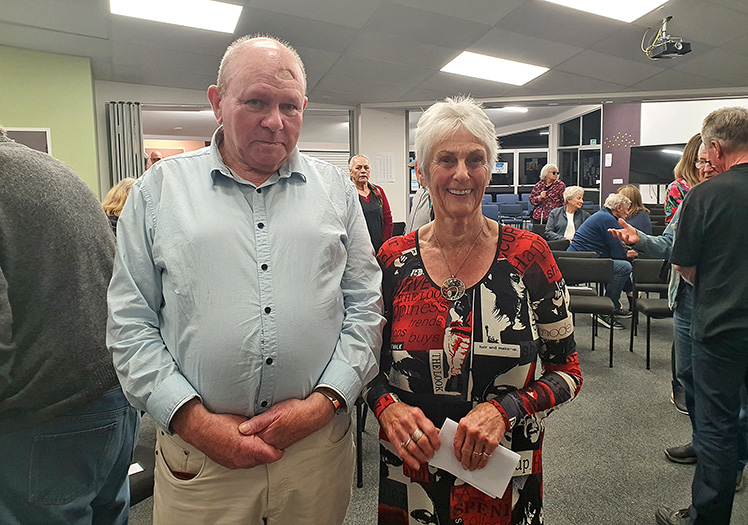Challenging Councils tour

SPEAKING TOUR: Challenging Councils’ Mark Quinn with Whakatāne meeting organiser Raewyn Weller. E5007-01
Diane McCarthy
- Corruption, conspiracy and toxic fruit allegations
ANYONE who believes United States tech tycoon Bill Gates has an interest in poisoning the food on our supermarket shelves would likely have felt among friends at the Challenging Councils meeting on Tuesday night.
Action group Challenging Councils founder Mark Quinn spoke to upwards of 50 people at a meeting held at Whakatāne’s Knox Presbyterian Church.
The meeting was the last Bay of Plenty stop in Mr Quinn’s nationwide speaking tour.
While most attendees were drawn to the meeting by a shared concern about increasing rates and increased council borrowing and spending, other topics discussed included 5G cell tower-induced illness, Smart Cities being used to control vehicles, and the United Nations and World Economic Forum controlling our councils and dictating property Quotables Values.
Mr Quinn introduced himself as “Brierley’s old hatchet man”, and as having degrees in commerce and horticulture.
“I went out on my own after the ‘88 crash and got into business consultancy. I spent 32 years living out of a suitcase, travelling New Zealand,” he said.
Mr Quinn spoke for over an hour about corrupt accounting practices and extreme borrowing by councils around the country that he said had been uncovered by his organisation and were “not known to the public”.
He proudly stated that Nelson Mayor Nick Smith had told him he was “a mischievous muckraker” and a liar at a public meeting.
He urged attendees to form a local group, offering the support of the Challenging Councils board, established this year.
“On our board we have accountants, we have a surveyor, we have auditors, we have a barrister, we have lawyers, we have researchers, an economist a political scientist.”
Attendees were asked to make a donation.
“Our only form of income is through a koha.”
Whakatāne Mayor Victor Luca and district councillor Andrew Iles, who have both been strong advocates for reducing council spending, fronted up to the meeting and attempted to address some of the concerns of attendees.
Dr Luca said while arguments about how the council spent ratepayers’ money were valid, he defended the council against any accusations of corrupt or fraudulent practices.
“I’ve been in council four or five years, and I haven’t seen any of this overt corruption you are talking about. I was surprised at how transparent it is. As far as I know there is only one set of books.”
Dr Luca argued that all the council’s long-term and annual plans and annual reports underwent a thorough independent auditing process and did not require further “forensic” auditing.
“All of this is public. I mean, our council meetings are broadcast in real time. If you go on the council’s website, you will find all this information.”
Mr Iles agreed.
“Speaking as a councillor of over 16 years, “I don’t think we are a fraudulent organisation. We are very studious over our expenditure. It comes down to levels of service. You mentioned rubbish on the roads, for example. We could have that rubbish picked up, but it does come at a cost.
“We have to be prudent in what we’re doing. We are, but we could do with less debt, for sure.”
Some ratepayers expressed concerns over their ability to pay increased rates, with one man with a family of young children stating that even on a salary of $100,000, coping with rates rises was difficult.
A Rotoma woman said Whakatāne district rates rises compared favourably to those in her area where increases in sewerage charges had led to increases of 100 percent.
Many at the meeting, however, were eager to conflate these genuine issues with commonly repeated conspiracy theories, such as council staff being puppets of the United Nations and the World Economic Forum.
Mr Quinn urged the audience to be very careful what they ate with Bill Gates having produced a wax product called Apeel, containing “cyanide, lead and fluoride”.
“It’s here in New Zealand. They’re actually putting a sticker over it, so you guys buy a lollipop and carry on eating it. Check what you’re buying from overseas. Check that you’re buying the right product,” Mr Quinn urged.
Apeel is an edible coating applied to some overseas fruits as an alternative to fruit waxing or single use plastics to extend their life, cutting down onfood waste. It is made from amino acids already found in fruit peels which the World Health Organisation has found to have no harmful effects.
While the company founder did receive an initial grant of $100,000 from the Bill and Melinda Gates Foundation in 2012 to help reduce post-harvest food waste in developing countries that lacked refrigeration infrastructure, Bill Gates has no other involvement with the company.
According to Wikipedia, a disinformation campaign had confused the Apeel product with a similarly named household cleaning product.